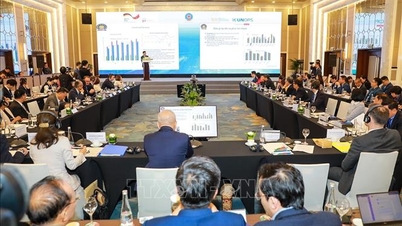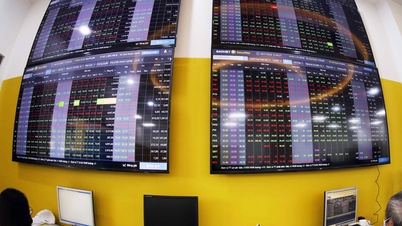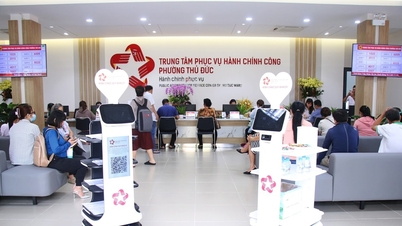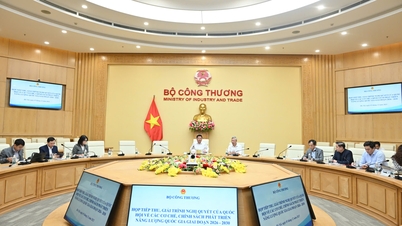On the afternoon of October 9, the Danang City Electronic Information Portal coordinated with the State Bank of Vietnam Region 9, the City Tax Department and the accompanying unit VNPAY to organize an online discussion with the topic "Cashless payment and electronic invoices - An inevitable trend in the digital age" .
The event took place in the context that Da Nang is focusing on implementing solutions to build e-government and comprehensive digital transformation in all fields - from public administration, finance, trade to people's lives.
State-technology enterprise synergy: creating “leverage” for digital payments to spread
VNPAY representative - Mr. Tran Manh Nam, Director of Enterprise Division said, in Da Nang, VNPAY has been closely coordinating with management agencies to expand the digital payment ecosystem.
.jpg)
The unit has worked with the City People's Committee, Department of Industry and Trade, Department of Culture - Sports and Tourism as well as wards and districts to guide business households and small traders to apply QR payment, use PhonePOS application to turn phones into POS machines, thereby helping the transaction process to be more convenient, safe and transparent.
In parallel, VNPAY launched a program to provide 30,000 free electronic invoices and 3 years of digital signature use for businesses and small business households, contributing to reducing operating costs and supporting digital transformation right from the grassroots level.
In the field of tourism and services, VNPAY cooperated with the Department of Culture, Sports and Tourism to integrate QR payment with digital services such as booking taxis, hotels, and sightseeing tickets on the VNPAY application, creating conditions for international and domestic tourists to easily pay and use digital utilities throughout their journey in Da Nang.
“The success of the process of popularizing cashless payments does not come from a single factor but from the resonance between technology, policy and people's habits. Technology is the foundation, policy is the lever, and consumer habits are the deciding factor,” said Mr. Tran Manh Nam.
To promote behavioral change, VNPAY focuses on developing user-friendly technology, creating convenient experiences and attractive incentives for people to proactively switch to using electronic payments.
On the management side, Mr. Vo Minh - Deputy Director of State Bank Region 9 said that Da Nang is currently one of the leading localities in the country in digital transformation in the banking sector.
According to statistics, the whole city has more than 102 level 1 branches and 328 transaction offices; 821 ATMs, 82,000 payment acceptance points, of which more than 9,000 are card swiping machines, the rest are QR codes; there are 3.54 million active cards.
Notably, the rate of transactions via electronic channels reached 87.5% of total payment transactions - clear evidence of the strong shift from cash to digitalization.
However, Mr. Vo Minh also pointed out that the habit of using cash is still popular among a part of the elderly, rural or mountainous areas; some small businesses are still afraid of risks when using online services.
Therefore, the State Bank aims to strengthen communication work, guide people on safe use, and coordinate with competent authorities to organize training and seminars to improve information security skills and data security awareness in electronic transactions.
“Synchronous coordination between banks, payment intermediaries and local authorities is the key to expanding the cashless payment network, ensuring convenience, safety and transparency for people and businesses,” Mr. Vo Minh emphasized.
Electronic invoice – transparent management platform, supporting digital economic development
According to Mr. Ngo Dinh Hung - Deputy Head of the Tax Department of Da Nang City, the implementation of electronic invoices brings many practical benefits to businesses, people and management agencies.

For businesses, electronic invoices help save costs on printing, storage, and delivery; at the same time, creating, issuing, and storing invoices is done online, making it easy to look up and compare data. The system is highly secure, limiting the risk of counterfeiting and errors and increasing professionalism in business operations.
For consumers, electronic invoices make shopping safer and more transparent: buyers receive invoices via email or text message, can check the legality on the tax portal, ensure rights when making a warranty claim, making a complaint or participating in the "lucky invoice" program.
For management agencies, instantaneous transmission of invoice data helps to better control business activities, promptly detect tax fraud, and serve policy planning and revenue management.
However, the implementation process still faces many difficulties. Many households and small businesses do not have IT equipment, stable internet connection or are still confused in using the software.
Some people are still reluctant to change, are used to using paper invoices, and do not see the direct benefits of the conversion. In addition, the registration and verification procedures for taxpayer information sometimes take time because the data is not synchronized with the national database.
Faced with this reality, the City Tax Department has synchronously deployed many support solutions: organizing "hand-holding" training, issuing leaflets, instructional videos, promoting via social networks and coordinating with the People's Committees of wards and communes to directly approach business households.
The Tax Department also maintains a hotline, Zalo channel, and email box for technical support; and coordinates with units providing electronic invoice software and digital signatures to deploy free or low-cost installation for small businesses.
Notably, the Da Nang Tax Department is coordinating with commercial banks and payment intermediary organizations to connect data, monitor cash flow, and warn of unusual transactions, thereby increasing transparency and preventing tax fraud. This is an important step in building a synchronous electronic tax management system, contributing to promoting sustainable development of the digital economy.
According to Mr. Ngo Dinh Hung, the success of cashless payments and electronic invoices depends not only on technology, but also on the cooperation of people, businesses and the government.
When these factors are operated in harmony, Da Nang will become a model of smart city - where all transactions, payments, and tax declarations take place in a safe, transparent, and efficient digital environment.
Source: https://daibieunhandan.vn/thanh-toan-so-va-hoa-don-dien-tu-buoc-tien-cua-do-thi-so-da-nang-10389725.html







![[Photo] Cat Ba - Green island paradise](/_next/image?url=https%3A%2F%2Fvphoto.vietnam.vn%2Fthumb%2F1200x675%2Fvietnam%2Fresource%2FIMAGE%2F2025%2F12%2F04%2F1764821844074_ndo_br_1-dcbthienduongxanh638-jpg.webp&w=3840&q=75)






































































































Comment (0)